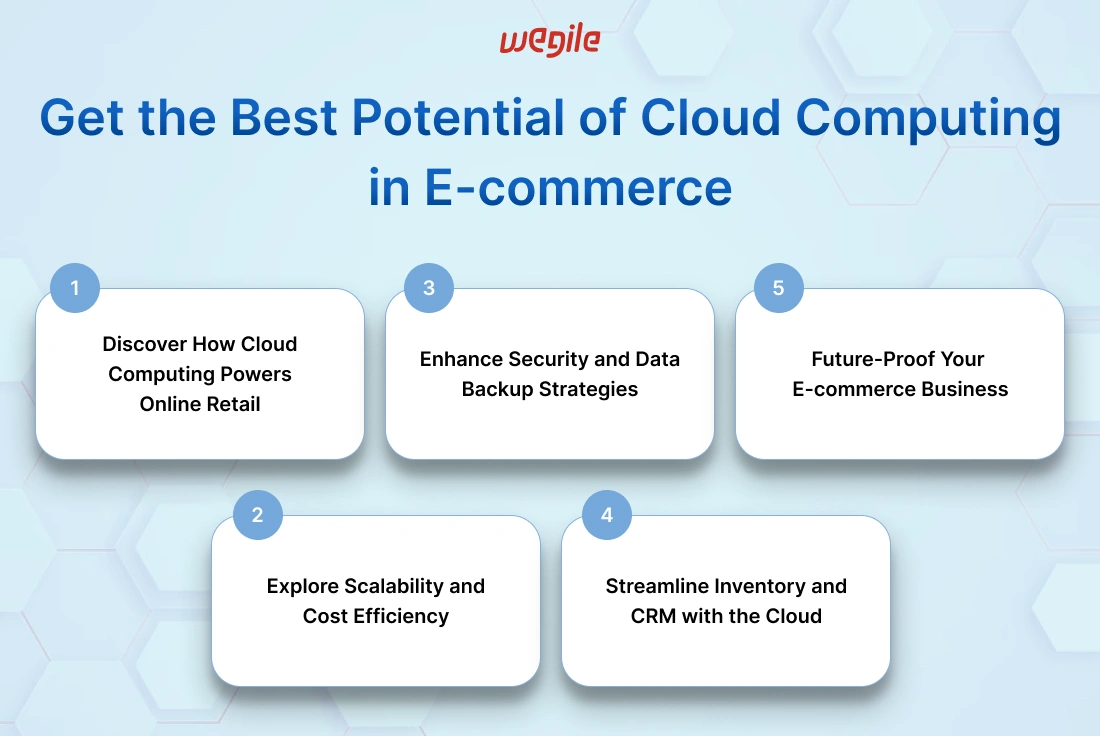The global market for cloud computing will reach USD 1,266.4 billion by 2028. This shows the mighty potential of cloud computing in multiple sectors. Cloud computing is working its magic in the healthcare, finance, and IT sectors. It is also going to level up the e-commerce sector, as over 90% of enterprises now use cloud-based services. Cloud solutions bring numerous benefits, such as flexibility and security to e-commerce apps and platforms.
This detailed blog will explore how cloud computing is changing e-commerce. We will explain how it drives growth and reshapes online retail's future.

Cloud computing in e-commerce involves internet-based services. These services host and organize various areas of an online business. They deliver flexible and cost-effective infrastructure for e-commerce platforms. Cloud computing solutions also allow enterprises to handle website hosting and data storage. They also assist in inventory management and customer transactions with greater precision.
Companies can easily scale up or down based on traffic and demand by using cloud technology. This promises smooth user experiences and reduces downtime. Popular e-commerce platforms such as Amazon, Shopify, and eBay also utilize cloud computing. This helps them to organize their global operations and curate seamless shopping experiences.
Let’s now explore the best advantages of cloud computing for the e-commerce sphere:
Cloud computing supports e-commerce businesses to scale resources up or down effortlessly. This scaling is performed based on traffic and demand. This flexibility promises smooth website performance even during peak shopping seasons. It doesn't need costly hardware investments.
E-commerce businesses save on infrastructure costs to great extents by the seamless incorporation of cloud computing solutions. These businesses do this by paying only for the cloud services they use. It cuts the need for massive upfront capital investments in servers and storage. This pay-as-you-go model is ideal for startups and thriving businesses.
Cloud providers present advanced security measures. The security features ensure that e-commerce businesses can protect customer data. This also helps safeguard transactions and sensitive information from cyber threats.
Cloud computing promotes quick deployment of new features, updates, and services. E-commerce platforms can swiftly introduce new products with cloud computing powers. They can optimize user interfaces and level up customer experiences without major disruptions.
Cloud services help e-commerce businesses to operate seamlessly across multiple regions. Cloud computing makes data and applications accessible from anywhere. This further ensures that customers from different locations experience fast and reliable services.
Let’s now take a look at the top use cases of cloud computing in the e-commerce realm:
E-commerce businesses rely heavily on high-performing websites. Here, cloud computing promises that they can maintain uptime and speed. Cloud-based hosting provides the proficiency to scale server resources up or down in real time. This helps e-commerce platforms to handle sudden traffic surges. This rescues crashing or slowing down and improves both user experience and search engine rankings.
Cloud computing also offers auto-scaling capabilities. This means that as traffic fluctuates, resources are automatically adjusted without the need for manual intervention. Cloud hosting also includes built-in redundancy, meaning that if one server experiences an issue, traffic is seamlessly rerouted to another. This high availability and reliability ensure minimal downtime. It leads to improved customer trust and enhanced SEO rankings as search engines favor consistently fast and stable websites.
Cloud computing brings scalable data storage solutions for e-commerce businesses. It ensures secure storage of vast amounts of customer data. It also helps manage transaction records and product information. Businesses benefit from automatic data backups with the cloud. They can ensure that the critical information is always accessible. It reduces the risk of data loss due to hardware failures. It also enhances reliability and maintains customer trust, which is pretty crucial for brand reputation.
In addition to secure storage, cloud solutions also offer advanced encryption and compliance features. These features are crucial as data privacy regulations, such as GDPR, tighten.
Cloud-based inventory management systems bring in real-time tracking of stock levels. They also help in tracking sales and deliveries with ultimate precision. E-commerce businesses can streamline supply chains with great precision. They can forecast demand with more accuracy and automate stock replenishment processes.
Companies can avoid stockouts and improve product availability by having efficient inventory management. This not only boosts customer satisfaction but also levels up their SEO by keeping popular products available for purchase.
Cloud computing powers sophisticated CRM platforms. It allows e-commerce businesses to collect and store data. It also helps analyze customer data sets with sheer accuracy. These insights support the creation of personalized marketing campaigns. It assists in tailoring recommendations and enriching customer support.
E-commerce platforms can boost customer retention and conversion rates by leveraging cloud-based CRM systems. This personalization multiplies user engagement and retention. This positively impacts SEO rankings through higher click-through rates and longer session times.
Cloud-based disaster recovery services guarantee that e-commerce businesses can recover from cyberattacks with great precision. This helps guard against server crashes and natural disasters without major disruptions.
E-commerce platforms can restore their operations swiftly, which further minimizes downtime. A stable and uninterrupted user experience protects revenue. It also helps maintain strong SEO performance because website stability and uptime are vital factors in search engine rankings.
The future of cloud computing in e-commerce is set to revamp the way online businesses operate. It is driving innovation, efficiency, and scalability at a rapid pace. Cloud technology will play an even more critical role in transforming customer experiences and streamlining operations. Here’s how the future of cloud computing is shaping e-commerce:
Cloud computing will continue to support the integration of artificial intelligence (AI) and machine learning (ML) into e-commerce platforms. These technologies will encourage hyper-personalized shopping experiences. They will do this by analyzing customer behavior and preferences in real time. AI-driven product recommendation and dynamic pricing will become more precise. Personalized marketing will also become pretty scalable with cloud-powered analytics.
Cloud computing will further stimulate global expansion for e-commerce businesses. It will do this by providing access to international cloud infrastructures. The cloud will offer the tools to localize and manage content. It will support multi-region operations by ensuring fast and reliable service across the globe, regardless of customer location. This can enormously improve site speed and SEO performance in multiple regions.
Cloud providers will continue to invest in advanced security features such as encryption and multi-factor authentication. The investments in compliance management will also inflate at a rapid pace. Using cloud-based security will be necessary for safeguarding customer data and maintaining trust for e-commerce businesses. This will be key for both reputation and SEO rankings.
The rise of serverless computing will revamp how e-commerce businesses regulate backend processes. The serverless cloud architecture will allow companies to only pay for the exact computing resources used during an event, such as processing a transaction. This cost-effective model cuts overhead while improving operational efficiency. It will allow businesses to focus more on enriching customer experience and less on infrastructure management.
The future of cloud computing in e-commerce will support the seamless integration of omnichannel retail experiences. Cloud-based systems will authorize e-commerce businesses to synchronize data across various sales channels such as online stores, social media, and brick-and-mortar shops. It will provide customers with a consistent shopping experience. This unified approach will boost customer loyalty and improve brand visibility. It will ultimately benefit SEO performance by increasing user engagement and satisfaction.
Cloud computing has become an important factor for e-commerce businesses. It offers scalable solutions that address both operational challenges and the growing demands of consumers. Cloud technology empowers online retailers to stay competitive in an ever-evolving digital landscape.
As cloud adoption continues to rise, businesses that embrace these technologies will be better positioned to innovate. They will be able to streamline processes and achieve long-term success. No matter, if you're a small retailer or an enterprise-level player, using the power of cloud computing can enrich your e-commerce strategy to great extent.
Reap the full potential of your e-commerce business with Wegile's smart e-commerce app development solutions empowered by cloud computing solutions! We will help you get a platform that scales effortlessly and delivers lightning-fast performance. It will keep your data secure, all while giving your customers a seamless shopping experience.
With our expertise in e-commerce app development and cloud computing solutions, we’ll build and optimize your platform to not only meet today’s demands but also set you up for future growth. Ready to elevate your online store? Let’s create something incredible together. Contact us now to start your journey!
The future of cloud computing in e-commerce is set to revamp the way online businesses operate. It is driving innovation, efficiency, and scalability at a rapid pace. Cloud technology will play an even more critical role in transforming customer experiences and streamlining operations. Here’s how the future of cloud computing is shaping e-commerce:
The e-commerce cloud refers to cloud-based solutions. They are specifically designed for online businesses. The e-commerce cloud provides scalable infrastructure and storage. It also offers tools to manage e-commerce operations. It can manage hosting websites and handle transactions. The e-commerce cloud also deals with managing customer data. Businesses can efficiently scale their services based on demand by using cloud technology.
Cloud computing delivers computing services like servers and storage. It also provides databases and software over the Internet. For example, Google Drive is a cloud storage service. Here, users can store, access, and share files online without needing local storage.
It's called cloud computing because the internet is visualized as a cloud in network diagrams. This further represents its vast and abstract infrastructure. The "cloud" signifies accessing computing resources remotely via the internet rather than on local machines.
The four types of cloud computing are:
Services are provided over the Internet. Multiple organizations share them.
Services are dedicated to a single organization. They present more control and privacy.
Combines public and private cloud elements. This allows data to move between the two.
Shared infrastructure between several organizations with common goals or regulations. This includes educational institutions and healthcare systems.


 Browse Our Services
Browse Our Services
